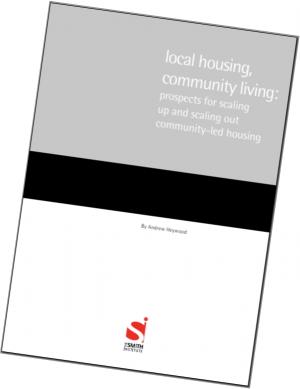
Find more posts
'Re-instate Community Grants Programme' says Smith Institute
Latest
January 27, 2016



A study of community-led housing by the Smith Institute, a left-leaning think-tank, has called for the government to re-instate the Empty Homes Community Grant Programme.
The report is the result of research funded by the Nationwide Foundation and conducted between April and September 2015. It considers all the significant varieties of community-led housing, including co-operatives, co-housing and Community Land Trusts, as well as the self-help housing groups that were the main beneficiaries of the EHCGP.
Challenges
The Executive Summary registers some of the key challenges affecting the sector:
- The public lack understanding and awareness of what the community-led sector is and how they can influence their communities by becoming involved
- There is also a lack of understanding of the benefits of community-led development among key stakeholders, such as local authorities and some housing associations.
- Focused support – particularly for nascent groups – is needed, as well as access to professional help and advice. Local authorities and housing associations play a part here, but they are under-resourced and face other pressures; in addition, they do not always understand what is required.
- Funding is not the biggest issue for the sector, but there is a chronic shortage of seed-corn funding (funding to help groups get established and plan their first steps) for some new groups and projects. There are also questions to be explored about the terms of lending for development and retail mortgage funding, and about the capacity of existing lenders to support rapid expansion, should it occur.
- The planning system need not be an impediment to the activities of community-led groups, but it can be when they lack adequate support and guidance. There are a number of specific planning-related measures (such as section 106 agreements, provision of serviced land by local authorities, and the neighbourhood planning process) where improvements can be made.
- Recommendation 1: Community-led housing groups should set up a country-wide network offering local support (which is not attached to any specific model of delivery) to emerging groups. Such a network could help improve and develop services, such as guidance, peer-to-peer support and mentoring. It could also develop a sector-wide communications and PR strategy aimed at the public and key stakeholders.
- Recommendation 2: The sector, in partnership with local authorities and other stakeholders, should press the case for dedicated, long-term HCA/GLA funding to support new community-led housing schemes. A new funding settlement should include support for new mechanisms, such as government guarantee schemes, low-interest loan funding and fit-for-purpose seed-corn grants and funding packages.
- Recommendation 3: Consideration should be given to exceptions for community-led housing groups to the recently announced redeployment of social housing grant for shared ownership rather than sub-market rent.
- Recommendation 4: The government should reinstate the grant funding used by community-led housing groups to bring empty homes back into use.
- Recommendation 5: The sector should investigate alternative ways in which seed-corn funding might be accessed. Potential sources might include the philanthropy sector and charitable institutions.
- Recommendation 6: The sector should work more closely with the retail mortgage industry to try to standardise restrictions on resale and make them compatible with lender requirements.
- Recommendation 7: The sector should work with local authorities on how to make planning more accessible to community-led groups, bearing in mind their more limited access to support and resources.
- Recommendation 8: The government should include explicit guidance on the role of community-led housing groups in securing affordable housing and community services (including to housing associations and local government) in a revised National Planning Policy Framework.
- Recommendation 9: The sector should work with local authorities to identify the circumstances in which section 106 agreements may offer opportunities for community-led initiatives. The results of this work should be communicated to local planners and to community-led housing groups.
- Recommendation 10: The government should review the neighbourhood planning process, with a view to simplifying the process and promoting community-led housing groups as affordable-housing providers.
- Recommendation 11: Guidance to local authorities under the Self-Build and Custom Housebuilding Act 2015 should give more attention to community-led housing.
- Recommendation 12: The UK government should learn from the successes of community-led housing activity funded by the Welsh Government and co-ordinated by the Wales Cooperative Centre.
